Thesaurus : Doctrine

► Full Reference: L. Aynès, "How International Arbitration can reinforce the Compliance Obligation", in M.-A. Frison-Roche (ed.), Compliance Obligation, Journal of Regulation & Compliance (JoRC) and Bruylant, "Compliance & Regulation" Serie, to be published
____
📘read a general presentation of the book, Compliance Obligation, in which this article is published
____
► Summary of the article (done by the Journal of Regulation & Compliance - JoRC): The author takes as his starting point the observation that International Arbitration and Compliance are a natural fit, since they are both a manifestation of globalisation, expressing an overcoming of borders, with arbitration being able to take on the Compliance Monumental Goals, since it has engendered a substantially global arbitral order.
But the obstacle lies in the fact that the source of arbitration remains the contract, with the arbitrator exercising only a temporary jurisdiction whose mission is given by the contract. Yet the advent of the global arbitral order makes this possible, with the arbitrator drawing on norms that may include the Compliance monumental goals and corporate commitments. In so doing, the arbitrator becomes an indirect organ of this emerging compliance law.
The contribution then suggests a second development, which could make the arbitrator a direct organ of compliance. For this to happen, the arbitrator must not only compel the fulfillment of an obligation to act, as is already the case with provisional measures, but also have a broader conception of the conflict for which a solution is required, or even free himself somewhat from the contractual source that surrounds it. This may well be taking shape, mirroring the profound transformation of the judge's office.
____
🦉This article is available in full text to those registered for Professor Marie-Anne Frison-Roche's courses
________
May 29, 2026
Editorial responsibilities : Direction of the collection Compliance & Regulation, JoRC and Bruylant

🌐Follow Marie-Anne Frison-Roche on LinkedIn
🌐Subscribe to the Newsletter MAFR Regulation, Compliance, Law
🌐Subscribe to the video newsletter MAFR Overhang
🌐Subscribe to the Newsletter MaFR Law & Art
____
► Full Reference: M.-A. Frison-Roche (ed.), Compliance Obligation, Journal of Regulation & Compliance (JoRC) and Bruylant, "Compliance & Regulation" Serie, 2026, to be published
____
📕In parallel, a book in French L'Obligation de compliance, is published in the collection "Régulations & Compliance" co-published by the Journal of Regulation & Compliance (JoRC) and Lefebvre-Dalloz.
____
📚This book is inserted in this series created by Marie-Anne Frison-Roche for developing Compliance Law.
read the presentations of the other books of this Compliance Series:
- further books:
🕴️M.A. Frison-Roche (ed.), 📘Compliance Evidential System, 2027
🕴️M.A. Frison-Roche (ed.), 📘Compliance and Contract, 2027
- previous books:
🕴️M.A. Frison-Roche (ed), 📘Compliance Juridictionnalisation, 2023
🕴️M.A. Frison-Roche (ed), 📘Compliance Monumental Goals, 2022
🕴️M.-A. Frison-Roche (ed.), 📘Compliance Tools, 2021
____
► go to the general presentation of this 📚Series Compliance & Regulation, conceived, founded et managed by Marie-Anne Frison-Roche, co-published par the Journal of Regulation & Compliance (JoRC) and Bruylant.
____
🧮the book follows the cycle of colloquia organised by the Journal of Regulation & Compliance (JoRC) and its Universities partners.
____
► general presentation of the book: Compliance is sometimes presented as something that cannot be avoided, which is tantamount to seeing it as the legal obligation par excellence, Criminal Law being its most appropriate mode of expression. However, this is not so evident. Moreover, it is becoming difficult to find a unity to the set of compliance tools, encompassing what refers to a moral representation of the world, or even to the cultures specific to each company, Compliance Law only having to produce incentives or translate this ethical movement. The obligation of compliance is therefore difficult to define.
This difficulty to define affecting the obligation of compliance reflects the uncertainty that still affects Compliance Law in which this obligation develops. Indeed, if we were to limit this branch of law to the obligation to "be conform" with the applicable regulations, the obligation would then be located more in these "regulations", the classical branches of Law which are Contract Law and Tort Law organising "Obligations" paradoxically remaining distant from it. In practice, however, it is on the one hand Liability actions that give life to legal requirements, while companies make themselves responsible through commitments, often unilateral, while contracts multiply, the articulation between legal requirements and corporate and contractual organisations ultimately creating a new way of "governing" not only companies but also what is external to them, so that the Monumental Goals, that Compliance Law substantially aims at, are achieved.
The various Compliance Tools illustrate this spectrum of the Compliance Obligation which varies in its intensity and takes many forms, either as an extension of the classic legal instruments, as in the field of information, or in a more novel way through specific instruments, such as whistleblowing or vigilance. The contract, in that it is by nature an Ex-Ante instrument and not very constrained by borders, can then appear as a natural instrument in the compliance system, as is the Judge who is the guarantor of the proper execution of Contract and Tort laws. The relationship between companies, stakeholders and political authorities is thus renewed.
____
🏗️general construction of the book
The book opens with a substantial Introduction, putting the different sort of obligations of compliance in legal categories for showing that companies must build structures of compliance (obligation of result) and act to contribute with states and stakeholders to reach Monumental Goals (obligation of means).
The first part is devoted to the definition of the Compliance Obligation.
The second part presents the articulation of Compliance obligation with the other branchs of Law, because the specific obligation is built by Compliance Law, as new substantial branch of Law but also by many other branchs of Law.
The third part develops the pratical means established to obtained the Compliance Obligation to be effective, efficace and efficient.
The fourth part takes the Obligation of Vigilance as an illustration of all these considerations and the discussion about the future of this sparehead fo the Compliance Obligation .
The fifth part refers to the place and the role of the judges, natural characters for any obligation.
____
TABLE OF CONTENTS
ANCHORING THE SO DIVERSE COMPLIANCE OBLIGATIONS IN THEIR NATURE, REGIMES AND FORCE TO BRING OUT THE VERY UNITY OF THE COMPLIANCE OBLIGATION, MAKING IT COMPREHENSIBLE AND PRACTICABLE
🔹 Compliance Obligation: building a compliance structure that produces credible results withe regard to the Monumentals Goals targeted by the Legislator, by 🕴️Marie-Anne Frison-Roche
TITLE I.
IDENTIFYING THE COMPLIANCE OBLIGATION
CHAPTER I: NATURE OF THE COMPLIANCE OBLIGATION
Section 1 🔹 Will, Heart and Calculation, the three marks surrounding the Compliance Obligation, by 🕴️Marie-Anne Frison-Roche
Section 2 🔹 Debt, as the basis of the compliance obligation, by 🕴️Bruno Deffains
Section 3 🔹 Compliance Obligation and Human Rights, by 🕴️Jean-Baptiste Racine
Section 4 🔹 Compliance Obligation and changes in Sovereignty and Citizenship, by 🕴️René Sève
Section 5 🔹 The definition of the Compliance Obligation in Cybersecurity, by 🕴️Michel Séjean
CHAPTER II: SPACES OF THE COMPLIANCE OBLIGATION
Section 1 🔹 Industrial Entities and Compliance Obligation, by 🕴️Etienne Maclouf
Section 2 🔹 Compliance, Value Chains and Service Economy, by 🕴️Lucien Rapp
Section 3 🔹 Compliance and conflict of laws. International Law of Vigilance-Conformity, based on applications in Europe, by 🕴️Louis d'Avout
TITLE II.
ARTICULATING THE COMPLIANCE OBLIGATION WITH OTHER BRANCHES OF LAW
Section 1 🔹 Tax Law and Compliance Obligation, by 🕴️Daniel Gutmann
Section 2 🔹 General Procedural Law, prototype of the Compliance Obligation, by 🕴️Marie-Anne Frison-Roche
Section 3 🔹 Corporate and Financial Markets Law facing the Compliance Obligation, by 🕴️Anne-Valérie Le Fur
Section 4 🔹 Transformation of Governance and Vigilance Obligation, by 🕴️Véronique Magnier
Section 5 🔹 The Relation between Tort Law and Compliance Obligation, by 🕴️Jean-Sébastien Borghetti
Section 6 🔹 Environmental and Climate Compliance, by 🕴️Marta Torre-Schaub
Section 7 🔹 Competition Law and Compliance Law, by 🕴️Jean-Christophe Roda
Section 8 🔹 The Compliance Obligation in Global Law, by 🕴️Benoît Frydman & 🕴️Alice Briegleb
Section 9 🔹 Environmental an Climatic Dimensions of the Compliance Obligation, by 🕴️Marta Torre-Schaub
Section 10 🔹 Judge of Insolvency Law and Compliance Obligations, by 🕴️Jean-Baptiste Barbièri
TITLE III.
COMPLIANCE: GIVE AND TAKE THE MEANS TO OBLIGE
CHAPTER I: COMPLIANCE OBLIGATION: THE CONVERGENCE OF SOURCES
Section 1 🔹 Compliance Obligation upon Obligation works, by 🕴️Marie-Anne Frison-Roche
Section 2 🔹 Conformity technologies to meet Compliance Law requirements. Some examples in Digital Law, by 🕴️Emmanuel Netter
Section 3 🔹 Legal Constraint and Company Strategies in Compliance matters, by 🕴️Jean-Philippe Denis & 🕴️Nathalie Fabbe-Coste
Section 4 🔹 Opposition and convergence of American and European legal systems in Compliance Rules and Systems, by 🕴️Raphaël Gauvain & 🕴️Blanche Balian
Section 5 🔹 In Compliance Law, the legal consequences for Entreprises of their Commitments and Undertakings, by 🕴️Marie-Anne Frison-Roche
CHAPTER II: INTERNATIONAL ARBITRATION IN SUPPORT OF THE COMPLIANCE OBLIGATION
Section 1 🔹 How International Arbitration can reinforce the Compliance Obligation, by 🕴️Laurent Aynès
Section 2 🔹 Arbitration consideration of Compliance Obligation for a Sustainable Arbitration Place, by 🕴️Marie-Anne Frison-Roche
Section 3 🔹 The Arbitral Tribunal's Award in Kind, in support of the Compliance Obligation, by 🕴️Eduardo Silva Romero
Section 4 🔹 The use of International Arbitration to reinforce the Compliance Obligation: the example of the construction sector, by 🕴️Christophe Lapp
Section 5 🔹 The Arbitrator, Judge, Supervisor, Support, by 🕴️Jean-Baptiste Racine
TITLE IV.
VIGILANCE, SPEARHEAD OF THE COMPLIANCE OBLIGATION
Section 1 🔹 Vigilance Obligation, Spearheard and Total Share of the Compliance Obligation, by 🕴️Marie-Anne Frison-Roche
CHAPTER I: INTENSITIES OF THE VIGILANCE OBLIGATION, SPEARHEAD OF THE COMPLIANCE SYSTEM
Section 2 🔹 Intensity of the Vigilance Obligation by Sectors: the case of Financial Operators, by 🕴️Anne-Claire Rouaud
Section 3 🔹 Intensity of the Vigilance Obligation by Sectors: the case of Digital Operators, by 🕴️Grégoire Loiseau
Section 4 🔹 Intensity of the Vigilance Obligation by Sectors: the case of Energy Operators, by 🕴️Marie Lamoureux
CHAPTER II: GENERAL EVOLUTION OF THE VIGILANCE OBLIGATION
Section 1 🔹 Rethinking the Concept of Civil Liability in the light of the Duty of Vigilance, Spearhead of Compliance, by 🕴️Mustapha Mekki
Section 2 🔹 Contracts and clauses, implementation and modalities of the Vigilance Obligation, by 🕴️Gilles J. Martin
Section 3 🔹 Proof that Vigilance has been properly carried out with regard to the Compliance Evidence System, by 🕴️Jean-Christophe Roda
Section 4 🔹 Compliance, Vigilance and Civil Liability: put in order and keep the Reason, by 🕴️Marie-Anne Frison-Roche
Title V.
THE JUDGE AND THE COMPLIANCE OBLIGATION
Section 1 🔹 Present and Future Challenges of Articulating Principles of Civil and Commercial Procedure with the Logic of Compliance, by 🕴️Thibault Goujon-Bethan
Section 2 🔹 The Judge required for an Effective Compliance Obligation, by 🕴️Marie-Anne Frison-Roche
________
CONCLUSION
THE COMPLIANCE OBLIGATION: A BURDEN BORNE BY SYSTEMIC COMPANIES GIVING LIFE TO COMPLIANCE LAW
(conclusion and key points of the books, free access)
Oct. 2, 2025
Thesaurus : Doctrine

► Full Reference: R. Gauvain & B. Balian, "Opposition et convergence des systèmes juridiques américains et européens dans les règles et cultures de compliance" ("Opposition and Convergence of American and European Legal Systems in Compliance Rules and Cultures"), in M.-A. Frison-Roche (ed.), L'Obligation de Compliance, Journal of Regulation & Compliance (JoRC) and Editions Lefebvre - Dalloz, "Régulations & Compliance" Serie, 2025, pp.401-417.
____
📕read the general presentation of the book, L'Obligation de Compliance, in which this article is published
____
► English Summary of this contribution (done by the Journal of Regulation & Compliance - JoRC) : The authors approach Compliance Law through its tools, mainly compliance programmes through which companies comply with regulations and investigations conducted by companies at the request of public authorities to identify risks and new modes of defence consisting of entering into agreements with prosecuting authorities.
The article highlights the American inspiration behind this movement, whereby the State, primarily for the sake of efficiency, transfers the responsibility for pursuing "Monumental Goals" to businesses. Based on this, the article first shows how American mechanisms have been imported into Europe, particularly France, with the Convention judiciaire d'intérêt public, taking on many of the characteristics of the DPA, even if some specific features remain, for example in the alert mechanisms. Secondly, the convergence between the two systems is shown, because through the compliance obligations that form the core of these compliance tools, it is always Western values that are expressed, values that are common to American Law and European Law and European countries. It has enabled this importation, and we can now see that these values are more strongly upheld by Europe, particularly through the Vigilance duty and the DSA.
____
🦉This article is available in full text (in French) to those registered for Professor Marie-Anne Frison-Roche's courses
________
Sept. 4, 2025
Thesaurus : Doctrine

► Full Reference: B. Frydman & A. Briegleb, "L'obligation de compliance en Droit global ("Compliance Obligation in Global Law)", in M.-A. Frison-Roche (ed.), L'Obligation de Compliance, Journal of Regulation & Compliance (JoRC) and Éditions Lefebvre - Dalloz, coll. "Régulations & Compliance", 2025, forthcoming.
____
📕read a general presentation of the book, L'Obligation de Compliance, in which this contribution is published
____
► English summary of this contribution (done by the Journal of Regulation & Compliance - JoRC): The authors stress that the Contracts Law and Tort Law are essential in Compliance Law, particularly in its global legal perspective, since it goes beyond the legal systems of States and develops new normativities, at the level of each company, but also allows a new expression of public power through the Monumental Goals that Compliance Law claims to achieve globally. The weaker the States, the greater the delegation to the first level is operating.
In concrete terms, the authors examine a series of situations in which various organisations use compliance techniques to appropriate global power over things or people, which has the effect, and sometimes the purpose, of reducing the freedoms of people controlled in this way. Thus CSR, which was initially non-binding, is now the source of binding obligations, and the moral obligation expressed in codes of conduct can become a civil obligation, as the Supreme Court of California decided in 2002 in the Nike case.
In addition, "Comply or Explain" clauses are now commonplace, allowing the person subject to the legislation not to comply if they can justify it, which is the basis of the many information reports that companies are now required to publish.
Then, returning to the issue of liability, particularly in the digital environment, the article stresses the importance of 'conditional immunity from liability', taking the view from the European DSA that certain operators, such as hosting providers, are not liable unless they take on obligations, such as monitoring functions on contents published.
Finally, with regard to the duty of vigilance, it tends for the first time to align the scope of "responsibility" with the scope of "power", moral responsibility thus becoming legal responsibility, which would be like a new responsibility for others.
The result of all this is an "obligation to regulate others".
________
🦉This article is available for people who follow the Professor Marie-Anne Frison-Roche teaching
June 19, 2025
Thesaurus : Doctrine
► Référence complète : M. S. Erie, "Compliance in China, in China in compliance, Wiley, 2025.
____
► Résumé de l'article (par l'auteur) : Much of scholarly writing on compliance is derived from the experiences of Western multi- national corporations operating in developed economies. This introduction to the special issue “China in Compliance” departs from such convention by asking how compliance works in China. By broadening the scope of compliance studies to include non- Western contexts, including China and its relationship to the “Global South” and nondemocratic settings, the special issue breaks new ground in the empirical analysis of compliance industries, practices, and professionals. The special issue is comprised of seven articles that illustrate specific compliance problems for compliance in Chinese overseas direct investment. This introduction first provides a detailed overview of the growth of domestic corporate compliance in China over the last several years and then puts this growth in the context of Chinese companies engaging in overseas projects. It subsequently gives a roadmap of the articles and highlights their key themes and findings. The broader goal is to provide a conceptual foundation for the comparative study of compliance.
____
🦉Cet article est accessible en texte intégral pour les personnes inscrites aux enseignements de la Professeure Marie-Anne Frison-Roche
________
June 5, 2025
Thesaurus : Doctrine
► Référence complète : A. Supiot, "Droit du travail et dette de vie", Revue internationale du travail. 2025,165(1).
____
____

Dec. 20, 2024
MAFR TV : MAFR TV - Overhang

🌐suivre Marie-Anne Frison-Roche sur LinkedIn
🌐s'abonner à la Newsletter MAFR. Regulation, Compliance, Law
🌐s'abonner à la Newsletter Surplomb, par MAFR
____
► Référence complète : M.-A. Frison-Roche, "Les contours géographiques de la Compliance", in série de vidéos Surplomb, 20 décembre 2024
____
🌐visionner sur LinkedIn cette vidéo de la série Surplomb
____
____
🎬visionner ci-dessous cette vidéo de la série Surplomb⤵️
____
Surplomp, par mafr
la série de vidéos dédiée à la Régulation, la Compliance et la Vigilance


Oct. 10, 2024
Interviews
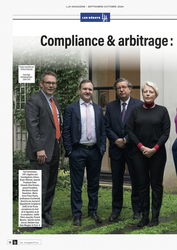
🌐follow Marie-Anne Frison-Roche on LinkedIn
🌐subscribe to the Newsletter MAFR. Regulation, Compliance, Law
🌐subscribe to the Newsletter Surplomb, by MAFR
____
► Full Reference: M.-A. Frison-Roche, E. Silva Romero, G. Filhol, V. Autret, B. Sillaman et K. Hennessee, Compliance & arbitrage : les prémices d’une symbiose, propos recueillis par O. Delaunay, LJA Magazine, septembre-octobre 2024, pp. 12-20
____
💬read the collective interview (in French)
____
🌐read the presentation of this interview on LinkedIn
____
► Topics covered during this collective interview:
-
The development of Compliance in an international environment
-
The Arbitrator and the concept of Compliance
-
Linking Arbitration and Compliance systems
____
► Summary of my interventions: Compliance Law appears to be developing in the context of international trade and Arbitration.
For my part, I placed particular emphasis on the fact that the first reports were the result of "negative reports" between Compliance and Arbitration, through Criminal Law and the obligation of arbitrators to ensure that they don't give effectivity to pacts of corruption. But the future lies in a more 'positive' and fruitful relationship between this new branch of law, Compliance Law, and the solid prospect offered by Arbitration, in that the arbitrator, this natural judge of international trade, will be able to support the contractualisation of Compliance obligations, particularly about due diligences in structural chains of activities and duty of vigilance.
Thus competent, the international arbitrator must respond to what the Monumental Goals in which Compliance Law is rooted expect of him/her: to provide solutions and remedies to issues that often concern an entire chain of activity or an entire sector in a more systemic perspective than in a traditional conception. This applies not only to investment arbitration, but also, for instance, to infrastructure arbitration. The concern for sustainability and the systemic perspective must be integrated into the reasoning and produce appropriate case law, a sort of new doctrine in the arbitration order, that will make more attractive the arbitration place that will most solidly link the skills of specialists in Compliance Law and Arbitration Law.
________
Sept. 25, 2022
Publications
🌐 suivre Marie-Anne Frison-Roche sur LinkedIn
🌐 s'abonner à la Newsletter MAFR Regulation, Compliance, Law
____
► Référence complète : M.-A. Frison-Roche, "Fonder la compliance", in Revue de l'ACE, La compliance, n° spéc. n°157, septembre 2022, p.17-31.
____
► Résumé de l'article : L'article traite le sujet en 20 étapes
- Pourquoi fonder les pratiques de compliance ? Pour des impératif pratiques
- Fonder les pratiques de compliance pour rendre supportables, car compréhensibles, les pouvoirs et les charges concentrés dans les outils de Compliance
- Fonder les pratiques de compliance pour maîtriser un savoir technique exponentiel
- Fonder les pratiques pour y trouver la part du Droit
- Fonder la Compliance sur les process d’efficacité
- Rendre supportable la Compliance fondée sur les process d’efficacité par un mix de procédure et d’éthique
- Les professionnels de la Compliance fondée sur des process
- La place particulière de l’avocat et du juge dans la Compliance fondée sur des process
- Fonder la Compliance sur l’obligation de donner à voir par avance que l’on se conforme à la réglementation applicable
- L’aporie de la Compliance fondée sur l’obligation de donner à voir par avance que l’on se conforme à la réglementation applicable
- Les charges engendrées de la Compliance fondée sur l’obligation de donner à voir par avance que l’on se conforme à la réglementation applicable
- L’impraticabilité de la Compliance fondée sur l’obligation de donner à voir par avance que l’on se conforme à la réglementation applicable
- Fonder la Compliance sur des buts substantiels ponctuels
- Les professionnels de la Compliance impliquées par la Compliance fondée sur des buts substantiels ponctuels
- Fonder la Compliance par des buts substantiels globaux et à venir
- Fonder la Compliance par les Buts Monumentaux, négatifs et positifs
- Les professionnels de la Compliance fondée sur les Buts Monumentaux
- La place particulière de la population concernée et de l'Etat dans la Compliance fondée sur les Buts Monumentaux
- La place particulière de l’avocat et du juge dans la Compliance fondée sur les Buts Monumentaux
- L'avenir du Droit de l'Avenir
____
____
____
lire la revue dans son intégralité
_________
Aug. 8, 2022
Compliance: at the moment

Référence complète : Frison-Roche, M.-A., "Rendre plus coûteux l'accès au marché de la Haine, Newsletter MAFR Law, Compliance", Regulation, 8 août 2022.
____
|
Dec. 6, 2021
Conferences

🌐 suivre Marie-Anne Frison-Roche sur LinkedIn
🌐s'abonner à la Newsletter MAFR Regulation, Compliance, Law
____
► Référence complète : Frison-Roche, M.-A., "Cas climatiques, devoir de vigilance, pouvoir des juges", dans la participation à la table rond "Notre planète brûle ; quels leviers d'action pour les entreprises et les Etats ?", in Paris Legal Makers, 6 décembre 2021.
____
► Consulter le programme général de la manifestation
____
► Revoir la vidéo de la table-ronde
____
► Résumé de l'intervention : Le débat d'une heure a porté sur les enjeux climats et la façon dont ceux qui font le Droit peuvent contribuer aux réponses que les entreprises et les État y apportent.
A ce titre et interrogée précisément par la journaliste sur le mouvent, j'ai mentionné que la population du monde entier s'adresse directement aux tribunaux qui ne les accueillent et appliquent un Droit en formation dans des législations à portée globales. Pour ne prendre que l'année 2021, dans des décisions sensationnelles, le Tribunal constitutionnel allemand dans sa décision du 29 avril 2021 a déclaré une loi votée par le Parlement allemand contraire à la Constitution, alors même qu'elle avait pour objet la lutte contre le changement climatique car elle laisse ouvert la possibilité pour l'État de ne rien faire avant 2030, alors même que les études scientifiques ont établi que l'inaction totale était l'assurance de la catastrophe climatique. L'alliance de la science et du Droit, la reconnaissance des droits subjectifs présents des générations futures (puisque leur sort aurait donc pu être déjà scellé) a conduit à cette solution.
Le mois suivant, le Tribunal de La Haye a condamné le 26 mai 2021 l'entreprise Shell à réduire de 45% ses émissions émission de gaz à effet de serre d’ici 2030, puisqu'elle s'y était engagée dans ses documents publics. En s'appuyant sur les textes de responsabilité, c'est une responsabilisation de l'entreprise et non pas un dédommagement pécuniaire : c'est de l'action concrète future qui est requise.
Le mois suivante, le Conseil d'État français dans sa décision Grande Synthe s'est appuyé sur la reprise par la France dans sa législation (loi de programmation) des Accords de Paris pour lui enjoindre de respecter sa propre législation, en suivant sa "trajectoire", la notion de transition étant nécessaire dans les questions climatiques et le Droit de la Responsabilité Ex Ante qui est en train de se mettre en place.
La suite du débat a mis en lumière l'importance du nouveau "devoir de vigilance" qui pèse sur les entreprises, notamment dans les enjeux climatiques.
Interrogée sur ce point, j'ai relevé que le Ministre des Affaires étrangères avait lui-même en ouverture de la journée souligné l'importance de la loi dite "Vigilance" de 2017 et de la prochaine directive en la matière. Effectivement, c'est un devoir qui engage une responsabilité, dont le Conseil constitutionnel a souligné qu'elle était personnelle et non pas pour autrui.
C'est à court terme une mauvaise nouvelle pour les entreprises mais à moyen ou long terme c'est aussi un moyen pour elles de jouer un rôle au niveau global, d'assurer un rôle plus important, d'obtenir des informations de la part des entités dont elles répondent, de changer de niveau, de faire une alliance avec les Autorités publiques et politiques. C'est cette nouvelle Compliance, notamment environnementale, calquée sur la loi dite "Sapin 2", qui n'est qu'un exemple du Droit de la Compliance, lequel est le Droit du Futur, le Droit par lequel le Futur est appréhendé par l'action, l'obligation d'agir ou la volonté d'agir.
Il est vrai que cela change leur gouvernance, notamment dans l'organisation probatoire, puisque les personnes qui leur demande des comptes n'ont plus la charge que de la "vraisemblance" et non plus tant de la preuve, et c'est un nouveau système probatoire qui se met en place, où les legal makers ont toute leur place dans le quotidien des entreprises.
Les Juges interviennent à la demande directe de la population. On leur reproche de répondre mais on leur en voudrait sans doute de ne pas le faire, ils veillent à toujours se référer aux "engagements" soit des entreprises (Shell), soit des Etats (Grande Synthe) ; sans doute anticipent-ils les textes de demain, qui arrivent (comme la directive sur la vigilance).
________
Nov. 27, 2021
Conferences

► Full Reference: Frison-Roche, M.-A., Chair for "The temporal dimension: Imminence and Intertemporally", in Climate Change Cases before National and International Courts Cross-fertilization and Convergence", November 27, 2021, Paris.
____
Summary of the panel presentation: The specific topic of our panel is the “temporal dimension” of the judicial cases of Climate change.
We shall listen to two great experts on this topic, which is Time.
Listening the other previous speakers, I understand how this topic is important, because Climate Change requires an immediate action and it create a political issue, because everyone comes before courts.
A basis and fundamental problem, because the times are not adjusted.
let's come back to basic notions, to have three times : “past, present, future”.
The issue of Climate Change is in the Future, the necessity of Action is in the Present and the basis temporal question is to know if Courts are the bodies adequate to responde ; maybe it is inevitable that Judge must be recreate their office because the time of the classical judicial office is the Past.
Immediately, this simple et huge problem appears : in a classical repartition, the judge is the legal character to intervenir for the Past, the present (maybe is for you and me), and the future is the time for the State, and more precisely for the Parliament.
But the climate change is a huge topic, not in the past, not in the present, but in the future.
Therefore a gap exists between the time of the topic and the time of the court before the case is explained for obtaining a solution : how to give a good answer ? Judge maybe must travel in time, from past to future …. Maybe, he must, but might he?
Classically, the judge can anticipate a very next future, but not the more distant and systemic future. Climate change belongs to the second one.
This is why the title of this panel is non only about the necessity to take in consideration the “imminence” but also the “intertemporally” : maybe court are the sole able to create this intertemporality between Past and Future, and by this way to obtain from States and companies to do something immediately !
By two legal ways.
Courts can stay in Past, supervising States, if they dispose of effective legal decisions taken by States in the past about Climate Change (essentially Paris Agreement, for instance transposed in the French legal system by a formal law). This is why an efficient judicial solution would be the possibility for the courts to oblige State to implement their more or less committment they had taken in the past for the future (as the Conseil d’Etat did in the Commune de Grande-Synthe Cas Law).
Even for that, the courts must adopt a creative notion of what is a commitment from a State through a Law... ; as they must do about private companies comitment (in their codes of conduct or soft law of corporate social responsability).
But what to do if States didn’t take such commitment ?
Some can allege Courts are not Parliaments and are not legitimate to rule for the future … It is a political issue, a very classical one but very accurate for Climate change (where States and companies are face to courts...) and maybe And as our colleague said, judicial system is quite technically weak to concretize human rights.
Therefore, the second way, more innovative, est the new use of Tort Law : no more a liability Ex Post, but a responsibility Ex Ante. In every legal system, even in Civil Law systems, Tort Law is conceived by courts (for instance in French Law).
If the new reasoning is conveived in Ex Ante, Tort Law must be a set of legal tools to reach the monumental tools to reach the "Monumental Goal" (being by nature future) which is the Climate Change stopping.
In this teleological reasoning, the admissibility and the choice remedies, must be adapted to obtain what is central : the effectivity and the efficiencicy.
In this sens, the judgement between two parties (which was an Ex Post act) may be conceived as an systemic efficient action (which was an Ex Ante act), because it must be.
_____
April 21, 2021
Thesaurus : Doctrine
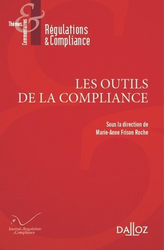
► Full Reference : J.-B. Racine, "Propos introductifs. La prégnance géographique dans le choix et l'usage des outils de la Compliance" ("Introductory remarks. Geographical dominance in the choice of Compliance Tools"), in M.-A. Frison-Roche (ed.), Les outils de la Compliance, coll. "Régulations & Compliance", Journal of Regulation & Compliance (JoRC) and Dalloz, 2021, p. 157-164.
____
📕read a general presentation of the book, Les outils de la Compliance, in which this article is published
____
► Summary of the article (done by the Journal of Regulation & Compliance): The author correlates Compliance Law and "Global Law" and underlines the balance of power that the former expresses, in particular on the part of the United States and even if it therefore "tends to become universal" , the particularities remain, if only in the implementation.
Focusing more particularly on "Compliance Tools", a comparison is made between several contributions of the volume, to establish that, in a definitive and desirable way, the Compliance mechanisms include both a global dimension and a local dimension.
________
Dec. 8, 2020
Thesaurus : Doctrine
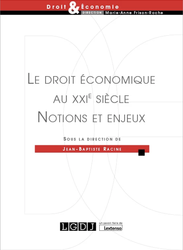
► Référence complète : Cl. Jourdain-Fortier, "La globalisation", in J.-B. Racine (dir.), Le droit économique au XXIe siècle. Notions et enjeux, LGDJ, coll. "Droit & Économie", 2020, pp. 365-393
____
📕consulter une présentation générale de l'ouvrage, Le droit économique au XXIe siècle. Notions et enjeux, dans lequel cet article est publié
____
► Résumé de l'article :
____
🦉Cet article est accessible en texte intégral pour les personnes inscrites aux enseignements de la Professeure Marie-Anne Frison-Roche
________
Nov. 27, 2020
Thesaurus : Doctrine
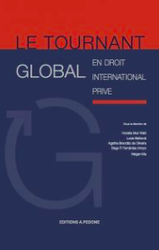
Full reference: Lagarde, P., Preface of Le tournant global en droit international privé, Muir-Watt, H., Biziková, L., Brandão de Oliveira, A., Fernández Arroyo, D. P., Ma, M. (ed.), Editions Pedone, 2020, pp. 9-14

April 24, 2020
Publications

Its subject is the confrontation between the current health crisis situation and the Compliance Law.
Summary. After defining Compliance Law, distinguishing the procedural and poor definition and the substantial and rich definition, the starting point is to admit the aporia: the type of health crisis caused by Covid-19 will be renewed and it is imperative to prevent it, even to manage it, then to organize the crisis exit. Public Authorities are legitimate to do so, but because this type of crisis being global and the State being consubstantially linked to borders, States are hardly powerful. Their traditional International Law shows their limits in this current crisis and one cannot hope that this configulration will improve radically.
In contrast, some companies and markets, notably the financial markets, are global. But the markets are not legitimate to carry out such missions and counting on the generosity of certain large companies is far too fragile in front of the "monumental goal" that is the prevention of the next health crisis, crisis which must never happen.
How to get out of this aporia?
By Compliance Law, basis of, in a literal and strong sense, the "Law of the Future".
We need to be inspired by the Banking and Financial Compliance Law. Designed in the United States after the 1929 crisis to tend towards the "monumental goal" of the absence of a new devastating crisis in the country and the world, this set of new legal mechanisms gave duty and power of supervision, regulation and compliance to market authorities and central bankers. These are independent of governments but in constant contact with them. Today, they claim to have as first priority the fight against climate change. Now and for the future, they must also be given the responsibility and the powers to prevent a global health disaster, similar to a global ecological disaster, similar to a global financial disaster. This does not require a modification of the texts because their mandate consists in fighting instability. Stability must become a primary legal principle, of which the fight against monetary instability was only a first example. By the new use that central banks must make of it by preventing and managing health crises, Compliance Law will ensure that the future will be not catastrophic.

March 22, 2020
Publications

This working paper is the basis for an article in the French Law Journal Le Clunet.
When we compare the terms "Compliance" and "Extraterritoriality", it is often with dissatisfaction, even anger and indignation. On the momentum, after having expressed a principle of disapproval of such a merger, attention is focused on how we can fight against it, to break the link between Compliance and Extraterritoriality. But do we have to go so fast? Is this negative initial assessment correct?
Indeed, thus gone, it is frequently explained that the binding mechanisms of Compliance are suffered, that they come from abroad!footnote-1750, that they apply with efficiency but in an illegitimate way, without agreement of the one who must submit to it, whose resistance is therefore certainly ineffective but nevertheless justified. In the same spirit, when we start to shell the cases, like so many scars, sort of rosary, even crown of thorns, BNPP case!footnote-1718, Astom case!footnote-1717, etc., the wounds not yet closed turn into reproaches made against the rules, public authorities, even reproaches made against named people.
We are leaving this kind of complaint against X, which targets what would be this appalling "Compliance", this Law which would be both hostile and mechanical which would not have been able to stay within the limits of borders, Compliance being thus placed in contrast to sovereignty and protection, which presuppose staying within its limits!footnote-1716 and being able to protect companies from abroad. More concretely, this presentation targets more directly the United States, which uses "the legal weapon", slipped under what is then designated as "the artifice of the Law" with extraterritorial scope. But this effect would in reality be the very object of the whole: their hegemonic will to better organize at least a global racket, notably through the Foreign Corrupt Practices Act (FCPA) and at best a world government through notably the embargoes.Those who believed otherwise would be naive or foolish. This silences the opponents because who likes this costume? So the world would be put in a ruled cut; what the mafia could not have done, Compliance Law would have obtained, offering the whole world to the United States thanks to the extraterritoriality of its national Law.
Compliance Law would thus become the very negation of Law, since it has the effect, even the purpose (barely concealed by strategic, powerful and shameless States), of counting borders for nothing, whereas Public International Law, in that it is built between the sovereign subjects of law that are the States presupposes the primary respect for borders to better exceed them while Private International Law takes the same postulate to better welcome foreign Law in situations presenting a foreign element!footnote-1726. Jurists believed in the force of Law; by Compliance, we would return to the sad reality that only the powerful, here the United States, dominate and - ironically - it is under the pretext of Law that they do it. It would be necessary to be well duped, or accomplice, to see there still legal where there is only the balance of powers. When one is more intelligent or skilful than that, one understands that the "small" can only be "subject" to the Compliance Law, one would have to be powerful to be the normative source and its enforcement agent. It is then towards this mis-named Department of Justice (DoJ) that the fearful, hateful and resigned glances turn.
If you see it that way, what should you do then? The answer is obvious: react!
It is necessary to save the sovereignty, France, companies, the Law itself. If that is how the question is posed, how can we disagree? It is therefore necessary to destroy the Compliance Law and the extra-territoriality of American Law which had found this "Trojan horse", an expression so frequently used. This is the basis for the administrative reports available, for example the Berger-Lellouche!footnote-1719 parliamentary reports and the Gauvainfootnote-1720 report. Both of them broadly develop the two preceding claims, namely that the extra-priority of compliance mechanisms is illegitimate and harmful, since it is a mechanism invented by the Americans and harming the Europeans, or even invented by the Americans to harm Europeans, the description being made in much more violent terms than those used here. The description seems acquired, the reflections therefore relate to the remedies. The reaction is most often to "block" the Compliance Law in its extraterritorial effect.
But without discussing the effectiveness of the remedies proposed downstream, it is necessary to return to this description so widely shared made upstream. Because many elements on the contrary lead to affirm that ComplianceLaw first of all and by nature can only be extraterritorial and that it must be. Whether or not the State in which it was created has malicious intentions. The description which is made to us most often describes particular cases from which we draw generalities, but we cannot reduce Compliance Law to the already cooled cases, as BNPP case, or to the always hot case of the American embargo on Iran. Furthermore, one cannot take the issue of embargoes and draw conclusions, legitimate for it, but which would apply to the whole of Compliance Law. The fact that theCompliance Law is a branch of Law at the stage still of emergence can lead to this confusion which consists in taking the part for the whole, but it is very regrettable because what is justified for the embargoes does not is in no way relevant for all Compliance Law, of which precisely the Law of embargoes is only a small part, even an abusive use. This overlapping is not often perceived, because the definition of Compliance Law and its criterion are not clearly enough defined, namely the existence of a "monumental goal"!footnote-1725, which does not exist in an embargo decided unilaterally by an order decreed by the President of the United States, but which exists in all other cases and fully justifies extraterritoriality, extraterritoriality which is even consubstantial with Compliance Law (I).
Once we have distinguished the embargoes, as an atypical, sometimes even illegitimate part, of Compliance Law, we should continue this work of distinction by emphasizing that the United States has certainly invented Compliance Law!footnote-1721 but only developed a mechanical concept for the prevention and management of systemic risks. Europe has taken up this systemic conception of the protection of systems, for example financial or banking, but superimposed another conception, drawing on its deep humanist tradition!footnote-1722, whose protection of personal data is only an example and whose monumental goal is the protection of the human being. This primary concern then justifies the European use of Compliance mechanisms to interfere with global objects regardless of their location, especially the environment, and to block the entry onto the ground of objects that enter, which is contrary to Competition Law but builds a legitimate barrier under this Compliance Law, in the indifference of an extraterritorial origin (II).
Indeed, this branch of the new Law which is Compliance Law is not reducible to Competition Law!footnote-1723, any more than it is not reducible to a method. It is a substantial, extraterritorial Law because the "monumental goals" which give it substantial unity are extraterritorial. This can directly contribute to the future of a Europe which on the one hand will be able to pursue, in an extraterritorial manner, monumental humanist goals, in the field of the environment or the protection of personal information or access to the Law (in particular by the technique of compliance programs) and which, on the other hand, by the techniques of traceability of products!footnote-1724, will have the means not to bring in products manufactured in an indecent manner, except in countries which do not grant value than in Competition Law to enter the WTO.
Read the developments below.
Jan. 16, 2020
Thesaurus : Doctrine
Reference: Patrick BOLTON - Morgan DESPRES - Luiz Awazu PEREIRA DA SILVA - Frédéric SAMAMA - Romain SVARTZMAN, The green swan: central banking and financial stability in the age of climate change, Banque des Règlements Internationaux, Janvier 2020
Oct. 25, 2017
Publications
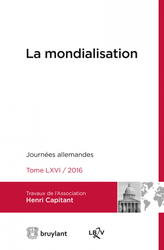
🌐follow Marie-Anne Frison-Roche on LinkedIn
🌐subscribe to the Newsletter MAFR Regulation, Compliance, Law
____
► Full Reference: M.-A. Frison-Roche, "La mondialisation du point de vue du Droit" (Globalisation from a legal perspective), in Association Henri Capitant, La mondialisation, t. LXVI/2016, Berlin, Bruylant, coll. "Travaux de l'Association Henri Capitant", 2017, pp. 11-30
____
📝read the article (in French)
____
____
🚧lire le document de travail bilingue sur la base duquel cet article a été élaboré, doté de développements supplémentaires, de références techniques et de liens hypertextes
____
► English summary of this article: Globalisation is a confusing phenomenon for lawyers. The first thing to do is to take the measure of it.
Once this has been done, it is essential to allow oneself to think something about it, or even to force oneself to think something about it. For example, on the novelty or otherwise of the phenomenon, which then enables us to assess what is being put in place.
If Law can and must "pretend" to defend every human being, a universal ambition that is intended to confront the global field of forces, then the next - but secondary - question is: quid facere?
Nothing? Less than nothing? Or regulate? Or do we still affirm that the Law fulfills its primary function, which is to protect the weak, even in the power struggle that is Globalisation?
____
📝read the summary and conclusive report of the symposium organised by the Association Henri Capitant, as part of the Journées internationales Allemande about La Mondialisation in Berlin, the 27 May 2016.
________

Updated: Oct. 25, 2017 (Initial publication: May 27, 2016)
Publications

► Full Reference: Frison-Roche, M.-A., Globalization from the point of view of Law, working paper, May 2017.
____
🎤 This working paper initially served as a basis for a synthesis report made in French in the colloquium organized by the Association Henri Capitant in the International German Days on the subject of "Le Droit et la Mondialisation" (Law and Globalization).
📝 Il sert dans un second temps de base à l'article paru dans l'ouvrage La Mondialisation.
📝 it serves as a second basis for the article (written in English, with a Spanish Summary) to be published in the Brezilian journal Rarb - Revista de Arbitragem e Mediação (Revue d`Arbitrage et Médiation).
It uses the Bilingual Dictionary of the Law of Regulation and Compliance.
____
► Summary of the Working: Globalization is a confusing phenomenon for the jurist. The first thing to do is to take its measure. Once it has been taken, it is essential that we allow ourselves to think of something about it, even if we have to think about it. For example, on whether the phenomenon is new or not, which allows a second assessment of what is taking place. If, in so far as the law can and must "pretend" to defend every being, a universal claim destined to face the global field of forces, the following question - but secondary - is formulated: quid facere? Nothing ? Next to nothing ? Or regulate? Or can we still claim that the Law fulfills its primary duty, which is to protect the weak, including the forces of globalization?
____
read the Working Paper below⤵️
Oct. 26, 2001
Thesaurus : Doctrine
Référence complète : Viney G., Pour ou contre un "principe général" de responsabilité pour faute ? Une question posée à propos de l'harmonisation des droits civils européens, in Le droit privé français à la fin du XXe siècle, études offertes à Pierre Catala, Litec, 2001, pp.555-568.
____
Résumé de l'article : L'auteur commence par rappeler que la lecture de l'article 1382 du Code civil comme s'il constitue une évidence n'est pas exacte historiquement, car c'est ultérieurement qu'on y a vu une règle à ce point général, un principe de responsabilité pour faute. Geneviève Viney souligne au contraire qu'antérieurement à 1804, il y avait pluralité de types de dommages et gradation des fautes, situation que l'on retrouva rapidement, dès le XIXième siècle avec la loi sur les accidents du travail ou l'arrêt Teffaine. C'est donc bien plutôt la pluralité des régimes spéciaux qui est l'ordinaire et donc la primauté d'un principe général. Mais le plus souvent, les deux articulent, le principe général exprimant alors la protection minimale s'appliquant faute de régime spécial.
Mais cet énoncé en droit français d'un principe général de responsabilité pour faute entrave l'harmonisation européenne car le droit allemand ne connaît qu'une liste limitative d'intérêts particuliers légitimes protégés par la responsabilité et le droit anglais s'exprime par le casuistique Torts Law qui exclut un principe général englobant.
Cela dit, la première partie de l'article est consacrée aux aspects positifs de l'admission d'un principe général de responsabilité pour faute. Le principal est que sa généralité permet son adaptabilité aux situations nouvelles, du fait de sa rédaction en termes universaux.
C'est ainsi que l'article 1382 a permis l'adaptation des solutions à l'évolution des structure économiques, par exemple en matière de loterie ou dans les nouvelles techniques de l'information (protection de la vie privée des personnes, information financière, responsabilité des hébergeurs sur Internet).
En outre, la responsabilité civile peut faire naître des droits subjectifs nouveaux, comme on l'a vu en matière de droits de la personnalité, et d'une façon plus générale, ce que l'on désigne comme "les droits de la personne".
Mais la seconde partie de l'article montre les aspects négatifs de l'admission d'un tel principe général de responsabilité. Le principal est que, du fait du caractère englobant du principe, il méconnait totalement la hiérarchie des intérêts. Ainsi, le plus léger dommage vaudra le plus vaste, la plus légère faute aura le même effet déclencheur que la plus répréhensible.
L'uniformité de régime, voulue par les codificateurs, est la faiblesse du dispositif. Le droit allemand au contraire hiérarchise les intérêts et n'y attache pas la même protection.
En outre, par sa généralité, la responsabilité est ouverte à toute victime, ce qui protège mal contre les actions excessives, alors que le duty of care anglais et le droit allemand y parent.
Enfin, le droit français est devenu confus car on établit de plus en plus difficilement la frontière entre le régime général et les régimes spéciaux, ce qui est source de complexité et d'incertitude. On peut prendre l'exemple du régime spécial du droit de la presse, notamment de ses règles de prescription, dans sa frontière mal tracée avec le droit général de la responsabilité civile.
_____